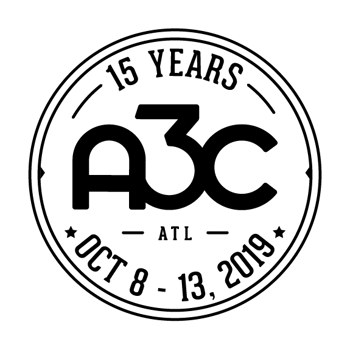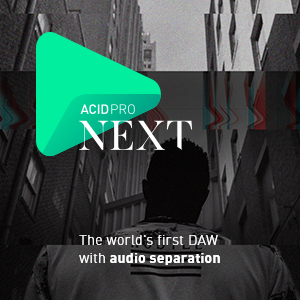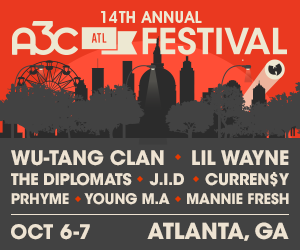Why you?
You're up against 1,000,000 other artists, so why you?
You're competing against millions of other artists who want the same thing that you do -- fans ears, and people to share your work.
What makes things even more difficult is the fact that the playing field is now level. No matter if you're a major artist, or a bedroom rapper -- you have the same damn tools. You have access to a recording set-up, and you have the marketing power of the internet.
Granted, sure -- a major label has a larger budget, but from a music marketing perspective, you are using the same resources as everyone else, and you have the same platform as everyone else does. So, why you?
I can't answer all of that for you -- but I can answer one part: Because of how you carry yourself.
I tell my artists and musician friends all the time that this isn't a race -- but it's a marathon. It's about who can stay on the treadmill the longest -- this is a game of perseverance. The only way you can (and will) stand out is simply be being professional in your approach.
The glory of indie music marketing, is that there are so many artists out there who are doing it badly, and unprofessionally, that one professionally written pitch makes you stand out ten fold over the rest.
When millions of other artists are out there pushing good art with the same tools: The devil is in the details.
Here are the details, the small things, that are holding you back from standing out.
Your Pitch Sucks.
We won't delve into this too much -- but there's been a pariah in the hip hop industry that's had a lot of negative effects on hip hop PR: pay-for-post blog stories.
This has really devalued the "sanctity" of being reviewed, as it makes reviews less special (who cares if you're in PopularRapBlog.com, when anyone can pay $75 and land a story) -- but most importantly, is that it's blurred what a genuine pitch is for artists.
If you're not familiar, these pay-for-post companies or e-blast services will get your work posted on a blog for a fee, and it's always the same set-up.
[Artist Bio]
[Link]
[Social Link]
There's no pitch, there's no story, it's just... well, links.
This is the standard template for the aforementioned pay-for-post services, and this same layout has seeped it's way into artist pitching. Some artists are starting to think that this is a pitch... but it's not. At all.
A writer does not want a bio and a few links. A writer wants an angle, or story they can run with.
Similarly, a writer can smell a copy and pasted pitch from a mile away. You want to make the writer feel important when you pitch them.
When crafting your pitch remember:
- Be concise, while still including all of your information.
- Personalized to the writer.
- Tell the writer why you're unique.
"Hey Mark,
Really loved your story on Chance The Rapper's latest tape. I'm also an indie artist who mixes that gospel sound with real-life stories. I will actually be performing at A3C this year, and just wrapped up a showcase at SXSW this March. Also just did a quick tour throughout Georgia, MS, LA and TX.
I was just featured on DJBooth last week, and I'd love if you guys gave it a spin, and see if it was a fit for you.
I'm including my EPK below, but I'm also giving you a direct stream link, too.
Speak soon."
Notice the above -- it makes Mark feel important, as you call out a recent piece he did. You also gave him two accolades (A3C and SXSW) as well as "proof of concept" by telling him that DJBooth also covered you. This will make him feel comfortable that his peers think you're hot, too. Lastly notice, it's short!
Your EPK is the place for the full bio and photo sets, the email pitch is meant for quick delivery, so that the writer wants to learn more.
Now -- what's to be taken more seriously. The above letter to Mark -- or a bio and three quick links?
Your Content Mix is All Wrong.
Sure -- social media isn't your music.
One shouldn't judge the music on an artist's social media presence ... but we do.
What you write and post on social media is part of your brand. It matters in your development as an artist. More importantly: writers, talent buyers, labels and more - look to your social channels to see how engaging you are.
Before making an investment in you, these entities want to see that fans are vibing with your work. So, if any of these people go to your website and see anything funky, it's just a straight up turn off.
The biggest turn off is a poor content mix.
Your pages need a mix of what's called the 70-20-10 rule. It states that 70% of your content should be brand building, 20% should be misc. content, and 10% should be straight up sales posts.
So, that 70% might be you in the studio, you tweeting about life on the road during your tour, or talking about how excited you are for the upcoming album. That 20% should be the personal side, the memes, the NBA finals, whatever you're genuinely into. Then 10% should be straight-up: buy my album, t-shirt, tickets..etc..
Is this a hard rule?
Not at all. There's also a lot of grey area -- for example, you can write one post that covers all of those criteria, really.
"Stopped by Tom's Eatery in Detroit. Fire late-night eats! Gotta get my milk-shake fix haha. We'll be in Kansas City tomorrow, pre-order at my website."
The above post hits all criteria: Tells fans your a performer doing shows in Detroit, it shows your personal side, while also plugging a pre-sale.
The point with the 70-20-10 rule is that you want your fans to be engaged with you, and not constantly spammed with mixtape links -- but you also want to post about your music, and not have them forget your an artist.
Keep it balanced!
Your Not Distributing or Publishing Your Work.
I see a lot of artists miss out on opportunities, because they think that a SoundCloud or YouTube link is enough. While a hot SoundCloud link can get you far, it's much better to have your work properly distributed.
Not only does having your work distributed through Spotify, Pandora, Apple Music, and Tidal make you look professional -- it's also genuine revenue streams, and opens up doors to music playlist additions and more. It's a way for more artists to discover you.
Some distributors such as TuneCore even offer publishing administration when you distribute through them. This means their team physically helps you get your music licensed -- which, you obviously need your work properly published and distributed to do so.
What if that Soundcloud link does get hot -- and a filmmaker wants to use it in a movie? Or a DJ wants to spin it on radio? You're going to need to get it together and get your publishing right first. And I bet that telling the filmmaker or DJ to "wait a few weeks" isn't going to sit well. So, please -- distribute your work, and get your publishing in order.
This is likely the shortest example, but it's also incredibly important. By having your paperwork in toe, all deals will move incredibly quicker.
Your EPK, Website and Materials Need Work.
When creating your EPK, I recommend using your own website, or a tool such as presskit.to.
I find that a lot of artists are using poor quality third party websites for their EPKs and they are just not well put together. They look like early websites and bad HTML jobs. Or, worse, you may still be using a PDF as your EPK. The PDF is old-school, and it's tough to download for the writer/venue and tough for the artist to update regularly.
Be sure that your EPK is the perfect example of your work, and simply put -- looks professional.
Don't use outdated pictures or unmastered tracks.
Do delete older listings and even older accomplishments regularly.
Your EPK should serve as a website for the industry. This isn't only for artists either -- check out major brands websites, they all have "press" on their website somewhere. It's essentially a long-form bio page, with recent news. This is the same for artists! A website is for your fans -- you want to sell merch there, and give them info on shows. Whereas an EPK is where a writer, or talent buyer gets all your info to make a booking or story decision.
It's important that you have all your materials available on your EPK (photos, links, videos, a bio) but it's also important that it is well-laid out and easy to navigate.
Beyond EPK upkeep, proper image sizes and lay out is important everywhere. Make sure ANY material you're posting is up-to-par. For instance, when posting on social media channels, make sure your image sizes are properly sized. No one likes a blurry photo when trying to promote your brand. This also goes for your website, make sure it's clean, concise and everything has it's proper dimensions.
Watch Your Email and Messaging Etiquette
I'm not saying that you have to use proper English when writing a journalist or booking agent -- as a publicist, I certainly don't. However, you should still be polite, and respectful of the persons time.
Steer clear of long copy and paste bios, instead, write someone a short message -- asking if they're interested in learning more. If yes, then send the long-form information.
However, it's more than just pitching, it's also just in organizing your thoughts and even your files. I remember once I had an artist ask if it was okay if he sent me his latest album. Of course, I said yes. I dug his work.
I then got 18 different emails, each with one song.
No one likes 18 emails -- a better route would have been to upload to a dropbox, or even a private SoundCloud. This was no big deal at all to me, but can you imagine if he did that to a reporter? That's the perfect way to end up in the spam folder.
Always think of how you're coming across online.
This goes beyond email -- @ing someone on Twitter with nothing but a link, is straight up spam. Autoresponders in your Twitter DM's, to where every follower gets a mixtape link is also spam.
We are here to build solid relationships.
Are You Just Trying to "Look" Like a Rapper?
Along with being a music marketing guy, I'm also a manager. I have mad respect and love for managers -- but I also find that well, sometimes artists aren't ready for them yet. I feel like some artists need to do things on their own, learn the industry and then bring in a manager.
I've approached artists for album projects or live show projects, only to be directed to a manager, then an intern, then back to the manager -- then back to the artist. When at the end of the day, the artist, manager and intern, should have all been able to give me the same answer.
If you have a big team under you, that's incredible! But as the artist, remember that you are the CEO, and that you have to be aware of what your team is doing, and how that team is supposed to operate. Be sure that everyone on your team is portraying you in the best light possible. It's one thing to turn off a writer on Twitter because you DMed him something he didn't like.
But it's another thing when someone on your team turns someone off -- because well, damn -- someone else is messing with your chances. You're going to need to be more in control than that. This goes beyond artists booking a manager too soon.
Don't get a manager just to have a manager.
(First, have something solid to manage.)
Don't drop 5K on the music video because you feel like you "need" a visual ASAP.
(All artists need visuals, but take your time, or create something simple, don't go broke trying to look like a rapper.)
Don't buy onto blogs, because your boys paid $250 to get on some random backlink URL.
(Pitch those outlets, and develop real relationships with writers.)
Don't pay to open up for T-Pain with 15 other artists, because other artists are doing it, too.
(Book gigs with a solid pitch and EPK. Don't fuel promoter's greed).
--
These are just a few small unprofessional things that my be turning off writers, booking agents, and even fans. Be sure to tighten up and button up.
I'm not saying you need to speak eloquently on Twitter and use proper English on social media. But I am saying you shouldn't spam your fans with random links.
I'm not saying you should spend hours networking on LinkedIn or fly to L.A. for an industry mixer. But I am saying that you should link up with local artists and see how you can help one another.
I'm not saying you need to be perfect. I'm just saying that by tweaking your approach, even slightly, you're going to go further and instantly stand out.
All I'm saying is: Act like you've been here.



